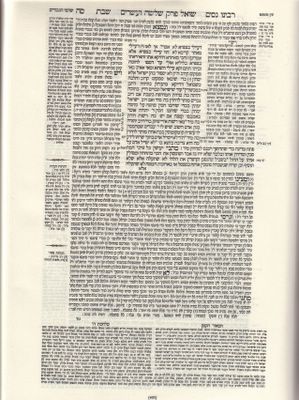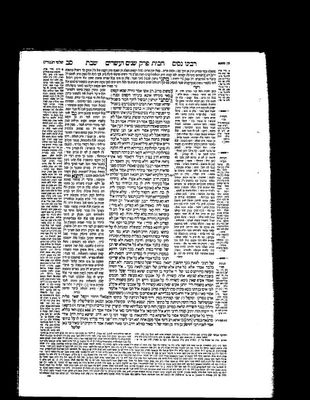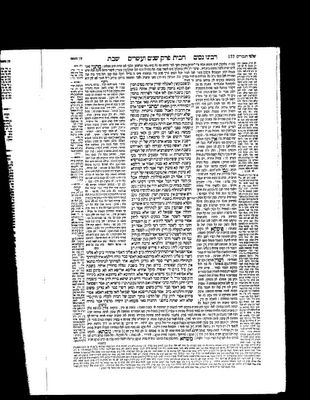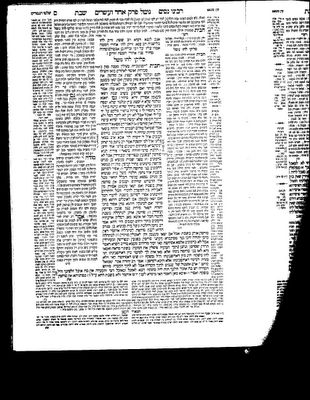
HIDE/SHOW IMAGE
65b
{Shabbat 151b continues}
Gemara:
The Sages learnt {in a brayta}: Cooling vessels and metal vessels may be brought and placed on his [the corpse's] stomach, in order that he should not swell, and his apertures may be stopped up, in order that the air should not enter. And [thus] said Shlomo too in his wisdom {Kohelet 12:6:
עַד אֲשֶׁר לֹא-ירחק (יֵרָתֵק) חֶבֶל הַכֶּסֶף - "Before the silver cord is snapped asunder" - this refers to the spinal cord.
וְתָרוּץ גֻּלַּת הַזָּהָב - "and the golden bowl is shattered" - this alludes to the membrum.
וְתִשָּׁבֶר כַּד עַל-הַמַּבּוּעַ - "and the pitcher is broken at the fountain" - that means the stomach.
וְנָרֹץ הַגַּלְגַּל אֶל-הַבּוֹר - "and the wheel falleth shattered, into the pit" - this refers to the excrements.
And thus it is is said {Malachi 2:3}:
chaggim {feasts}.
Rabbi Levi cited Rabbi Yehoshua deSichni {our gemara: Rabbi Levi cited Rabbi Pappi who cited Rabbi Yehoshua}: After three days [from death] the stomach bursts and it [its contents] lies cast out before his face and exclaims, 'Take what you have put in me.'
MISHNA:
ONE MAY NOT CLOSE [THE EYES OF] A CORPSE ON SHABBAT, NOR ON WEEKDAYS WHEN HE IS ABOUT TO DIE, AND HE WHO CLOSES THE EYES [OF A DYING PERSON] AT THE POINT OF DEATH IS A MURDERER {because he hastens the death}.
Gemara:
The Sages learnt {in a brayta}: He who closes [the eyes of a dying man] at the point of death is a murderer. This may be compared to a lamp that is going out: If a man places his finger upon it, it is immediately extinguished.
They learnt {in a brayta}: Rabbi Shimon ben Eleazar {our gemara: Gamliel} says: If one desires that a dead man's eyes should close, let him blow wine into his nostrils and apply oil between his two eyelids and hold his two big toes; then they close of their own accord.
They learnt {in a brayta}: Rabbi Shimon ben Eleazar {our gemara: Gamliel} says: For a day-old infant Shabbat is desecrated -- the Torah ordered, Desecrate one Shabbat on his account so that he may keep many Shabbatot; for David, King of Israel, dead, Shabbat must not be desecrated -- for it is written {Tehillim 88:6}:
| כְּמוֹ חֲלָלִים, שֹׁכְבֵי קֶבֶר-- אֲשֶׁר לֹא זְכַרְתָּם עוֹד; וְהֵמָּה, מִיָּדְךָ נִגְזָרוּ. | 6 Set apart {/free} among the dead, {N} like the slain that lie in the grave, whom Thou rememberest no more; {N} and they are cut off from Thy hand. |
They learnt {in a brayta}: Rabbi Shimon ben Eleazar says: A day-old infant, alive, need not be guarded from weasels or mice, but Og, king of Bashan, dead, needs guarding from weasels and mice, as it is said {Bereishit 9:2}:
Rav Papa said: We hold [as tradition] that a lion does not attack two persons [together].
But we see that it does? — That is [explained] as Rav Ami bar Abba, who said: A beast has no power over man until he {the man} appears to it as an animal, for it is said {Tehillim 49:13, 21}:
| כא אָדָם בִּיקָר, וְלֹא יָבִין; נִמְשַׁל כַּבְּהֵמוֹת נִדְמוּ. | 21 Man that is in honour understandeth not; he is like the beasts that perish. |
Rabbi Yochanan {our gemara: Chanina} said: One may not sleep in a house alone at night {our gemara omits "at night" - balayla, and whoever sleeps in a house alone at night is seized by Lilith. {an alliteration. Lilith= the night demon}
They learnt {in a brayta}: Rabbi Shimon ben Eleazar says: Perform [righteousness and charity] while you can find [an object for thy charity], have the opportunity, and it is yet in your power, and Shlomo in his wisdom too said {Kohelet 12:1:
| א וּזְכֹר, אֶת-בּוֹרְאֶיךָ, בִּימֵי, בְּחוּרֹתֶיךָ: עַד אֲשֶׁר לֹא-יָבֹאוּ, יְמֵי הָרָעָה, וְהִגִּיעוּ שָׁנִים, אֲשֶׁר תֹּאמַר אֵין-לִי בָהֶם חֵפֶץ. | 1 Remember then thy Creator in the days of thy youth, before the evil days come, and the years draw nigh, when thou shalt say: 'I have no pleasure in them'; |
וּזְכֹר, אֶת-בּוֹרְאֶיךָ, בִּימֵי, בְּחוּרֹתֶיךָ: עַד אֲשֶׁר לֹא-יָבֹאוּ, יְמֵי הָרָעָה - "Remember then thy Creator in the days of thy youth, before the evil days come" - this refers to the days of old age.
וְהִגִּיעוּ שָׁנִים, אֲשֶׁר תֹּאמַר אֵין-לִי בָהֶם חֵפֶץ - "and the years draw nigh, when thou shalt say: 'I have no pleasure in them'" - this refers to the Messianic era, wherein there is neither merit nor guilt.
Now he disagrees with Samuel, who said: The only difference between this world and the Messianic era is in respect of servitude to [foreign] powers, for it is said {Devarim 15:11}:
brayta}: Rabbi Eleazar haKappar says: Let one always pray to be spared this fate -- that is, the fate of poverty -- for if he does not descend [to poverty] his son will, and if not his son, his grandson, for it is said {previous pasuk}:
| י נָתוֹן תִּתֵּן לוֹ, וְלֹא-יֵרַע לְבָבְךָ בְּתִתְּךָ לוֹ: כִּי בִּגְלַל הַדָּבָר הַזֶּה, יְבָרֶכְךָ ה אֱלֹקֶיךָ, בְּכָל-מַעֲשֶׂךָ, וּבְכֹל מִשְׁלַח יָדֶךָ | 10 Thou shalt surely give him, and thy heart shall not be grieved when thou givest unto him; because that for this thing the LORD thy God will bless thee in all thy work, and in all that thou puttest thy hand unto. |
Rav Yosef said: We hold [as tradition] that a Rabbinical student will not suffer poverty. But we see that he does suffer poverty? Even if he suffers poverty, he [nevertheless] does not engage in begging {lit. 'going about the doors' (of houses)}
Rav Acha {our gemara: Rabbi Chiyya} said to his wife: When a poor man comes, be quick to offer him bread, so that others may be quick to offer it to your children.
She said {exclaimed} to him: You curse them {the children}!
He said to her: The verse {10, above} stated: כִּי בִּגְלַל הַדָּבָר הַזֶּה, and the academy of Rabbi Yishmael taught: It is a wheel {galgal} that revolves in the world.
They learnt {in a brayta}: Rabban Shimon ben Gamliel {our gemara: R Gamliel son of Rabbi} says: {Devarim 13:18}:
derasha presumably based on וְרִחַמְךָ and its juxtaposition} - He who is merciful to others, mercy is shown to him by Heaven, while he who is not merciful to others, mercy is not shown to him by Heaven.
{Shabbat 153a}
Rav Yehuda bar Shmuel bar Shelat {our gemara: Shela} cited Rav: From the funeral eulogy pronounced over a man it may be known whether the future world is his or not.
Is this indeed so?
But Rav said to Rav Shmuel bar Shelat: Be fervent in my funeral eulogy. for I will be standing there.' {and what need would there have been for this exhortation?}
There is no difficulty: in the one case a fervent lament is pronounced and one is deeply moved,in the other a fervent lament is pronounced and one is not moved.
Abaye said to Rabba: You, for instance, whom the whole of the Pumbeditheans hate {Rashi: because of his outspokenness}, who will arouse lamentation for you?
He said: You and Rava bar Rav Chanin will need suffice.
Rabbi Eleazar asked Rav: Which man has earned [enjoyment of] the future world?
He said to him: {Yeshaya 30:21}:
Some say {have the girsa}: Rabbi Eleazar asked Rav, and Rav asked Rabbi Chanina: Which man has earned [enjoyment of] the future world?
He said to him: He with whom his teachers are pleased.
We learnt {tnan} there: Rabbi Eliezer says: Repent one day before your death.
His disciples asked Rabbi Eliezer: Does then one know on what day he will die?
He said to them: Then all the more reason that he repent to-day, lest he die to-morrow, and thus his whole life is spent in repentance. And Shlomo too said in his wisdom: {Kohelet 9:8}:
| ח בְּכָל-עֵת, יִהְיוּ בְגָדֶיךָ לְבָנִים; וְשֶׁמֶן, עַל-רֹאשְׁךָ אַל-יֶחְסָר. | 8 Let thy garments be always white; and let thy head lack no oil. |
END PEREK TWENTY-THREE
BEGIN PEREK TWENTY-FOUR
MISHNA:
IF DARKNESS FALLS UPON A PERSON ON A ROAD {and so it is now Shabbat}, HE ENTRUSTS HIS PURSE TO A GENTILE;
BUT IF THERE IS NO GENTILE WITH HIM, HE PLACES IT ON THE ASS.
WHEN HE REACHES THE OUTERMOST COURTYARD HE REMOVES THE OBJECTS WHICH MAY BE HANDLED ON SHABBAT, WHILST AS FOR THOSE WHICH MAY NOT BE HANDLED ON SHABBAT , HE UNTIES THE CORDS AND THE SACKS FALL OFF {AUTOMATICALLY}.
















